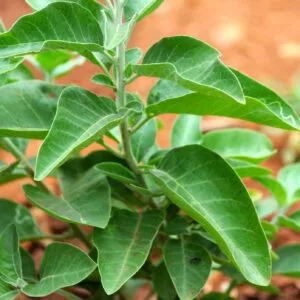Ashwagandha Seeds (10 seeds)
Original price was: ₹50.0.₹35.0Current price is: ₹35.0.
Ashwagandha helps to provide important immune support, boosting the immune system. Growing this medicinal herb in our home garden is bliss. Try our Non-GMO Ashwagandha Seeds. Also, check out our workshops for more details.
PRODUCT DESCRIPTION
Number of seeds in a packet – 10
PLANT DESCRIPTION
- Difficulty Level – Easy
- Plant Height – Upto 3 feet tall
- Aroma – Ginseng (Smell of Horse)
- Flavour – Sweet, Bitter and pungent
- Type – Indoor (Balcony / Terrace) or Outdoor
- Feed – VermiCompost for nutrients every week, Seaweed once a month for greener leaves and Epsom salt for better blooming once a month.
- Watering – Once a week
- Sunlight – Full Sunlight
- Germination Time – 1 week
- Suitable Temperature – 20°C – 35°C
- Season – Perennial
- Sowing – 2nd – 3rd week of August (Rainy season)
ALTERNATE NAME
Botanical name: Withania somnifera
ashwagandha seed in hindi: Ashvagandha (अश्वगंधा)
ashwagandha seed in tamil: Ashwangandha (அஸ்வகந்தா)
ashwagandha seed in telugu: Ashvangandha (అశ్వగంధ)
ashwagandha seed in kannada: Asvangandha (ಅಶ್ವಗಂಧ)
ashwagandha seed in bengali: Asbaganda (অশ্বগন্ধা)
ashwagandha seed in marathi: Ashwagandha (अश्वगंधा)
ashwagandha seed in malayalam: Ashvagandha (അശ്വഗന്ധ)
Other names : ashwaganda seeds, aswagadha, Arshagandha, Aswagandha, Aswagandha, Medicinal plants, ashwagandha seeds online
You must be logged in to post a review.
Q & A
The sustainability of organic herbal seeds depends on several factors, including cultivation practices, environmental impact, and the preservation of genetic diversity. Here are some points to consider regarding the sustainability of organic herbal seeds:
Organic cultivation practices: Organic farming methods focus on minimizing the use of synthetic fertilizers, pesticides, and genetically modified organisms (GMOs). By avoiding these inputs, organic farmers promote a healthier and more sustainable agricultural system. Organic herbal seed production follows these practices, ensuring that the seeds are grown in an environmentally friendly and sustainable manner.
Soil health and biodiversity: Organic farming emphasizes building and maintaining soil health through practices such as crop rotation, composting, and the use of natural amendments. These practices promote soil fertility and biodiversity, which are crucial for sustainable agriculture. Organic herbal seeds are often grown in soil that is rich in organic matter and supports diverse microbial populations, leading to healthier plants and more resilient ecosystems.
Genetic diversity: The sustainability of herbal seeds also depends on preserving genetic diversity within plant populations. Organic farmers often prioritize traditional and heirloom varieties, which contribute to maintaining genetic diversity and resilience in agricultural systems. This approach helps protect against the loss of genetic traits and ensures a broader range of plant adaptations to changing environmental conditions.
Conservation and seed saving: Organic herbal seed producers may engage in seed saving and conservation efforts, which involve selecting, saving, and sharing seeds from the most successful and desirable plants. This practice helps preserve traditional plant varieties and their genetic diversity, ensuring their availability for future generations. By encouraging seed saving and exchange, organic herbal seed producers contribute to the sustainability and resilience of our food and medicinal systems.
Local and small-scale production: Organic herbal seed production often occurs at a local or small-scale level, which can enhance sustainability. Local production reduces transportation distances and associated carbon emissions. Moreover, small-scale producers often employ traditional and regenerative farming techniques, which are more sustainable than industrial-scale monoculture farming.
Certification and transparency: Organic herbal seed producers can obtain certification from reputable organizations that verify compliance with organic standards. Certification provides assurance to consumers that the seeds have been produced in accordance with specific organic guidelines. Transparency in the supply chain, including clear labeling and traceability, further supports sustainability efforts.
By considering these factors, organic herbal seed production can contribute to sustainable agriculture, environmental conservation, and the long-term availability of diverse plant resources.
General Inquiries
There are no inquiries yet.



















Reviews
There are no reviews yet.